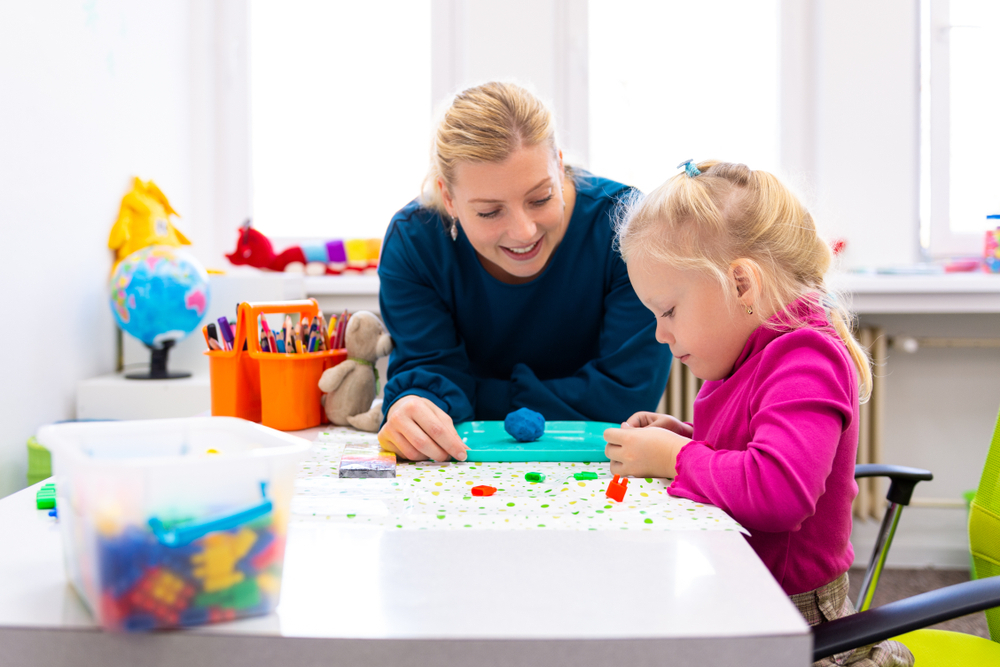Empowering Growth Through Occupational Therapy
Occupational therapy focuses on helping individuals of all ages achieve independence in their daily activities. For children, this includes tasks such as playing,learning,socializing, and self-care. OT interventions are designed to promote development and improve skills needed for success in various life activities.
Who Benefits from Occupational Therapy?
Areas we treat
1) Gross Motor Skills training
A: Occupational therapy can help children to develop Strong Gross Motor
Skills allow children to:
- Move confidently: Walk, run, skip, climb, play sports
- Master daily routines: Dress, bathe, attend school.
- Improve learning: Posture supports focus and engagement.
- Build stamina: Participate in activities throughout the day.
2) Fine Motor Skills training
A:Occupational therapists play a vital role in helping children develop and
improve fine motor skills crucial for everyday activities. These include:
- Grasping and manipulating objects (toys, utensils, writing tools)
- Handwriting and pencil grasp
- Buttoning, zipping, and dressing independently
- Cutting and manipulating small objects.
Through play-based activities and targeted interventions, OT helps children develop the fine motor skills needed for independence, improved self-esteem, and success in school and daily activities
3) Self-Care Difficulties:
A:Occupational therapy can help children overcome self-care challenges,fostering independence and confidence. OT addresses difficulties like
dressing, bathing, toileting, and eating, utilizing fun activities and strategies tailored to each child's needs. With OT support, children gain the skills they need to manage daily routines with greater ease and a sense of accomplishment.
4)Cognitive skills training:
A:Occupational therapy (OT) supports children in developing critical cognitive skills like planning, organization, and problem-solving. Through engaging activities and strategies, OT addresses difficulties like:
- Attention and focus: Managing distractions and maintaining concentration.
- Memory: Remembering instructions and following routines.
- Planning and sequencing: Breaking down tasks and completing them in the right order
- Cutting and manipulating small objects.
OT empowers children with the cognitive skills they need to succeed in everyday life and academic settings
5) Feeding Challenges:
A:Occupational therapy helps children overcome feeding challenges (textures,
chewing, pickiness) for healthier eating and less mealtime stress. Through fun activities, children develop a positive relationship with food and enjoy independent eating:
6) Social and emotional development
A: Playful OT sessions help children build social skills (making friends, joining activities), manage emotions (calmly express feelings), and understand themselves (recognize their own needs). This empowers them to navigate social situations with confidence and build healthy relationships

FAQS
add_circle_outline What is Occupational Therapy (OT)?
Occupational therapy focuses on helping individuals of all ages achieve
independence in their daily activities. For children, this includes tasks such as playing, learning, socializing, and self-care. OT interventions are designed to promote development and improve skills needed for success in various life activities.
add_circle_outline How can Occupational Therapy help my child with screen time management?
Occupational therapists at Kidscape can help you develop strategies to:
- Promote healthy screen time habits:This may involve setting limits, creating screen-free zones, and encouraging alternative activities
- Strengthen fine motor skills: Prolonged screen use can impact fine motor skills. OTs can provide exercises and play-based activities to improve dexterity, hand-eye coordination, and handwriting
add_circle_outline3. Can Occupational Therapy help my child with sensory processing challenges?
Yes, Occupational Therapy can help children with sensory processing
challenges. Therapists can use sensory integration techniques to:
- Help children regulate their sensory experiences (e.g., noise, touch, movement)
- Improve their ability to participate in daily activities
- Reduce sensory overload and anxiety
add_circle_outline 4. Can Occupational Therapy help my child succeed in school?
Occupational Therapy can address academic challenges by:
- Supporting executive functioning skills: These skills include planning,prioritizing,organization, and problem-solving. OTs can provide strategies to help children improve focus, manage their workload, and reduce stress.
- Developing fine motor and visual motor skills: These skills are crucial for tasks like writing, cutting, and copying.
add_circle_outlineCan Occupational Therapy help my child develop social skills?*
Yes, Occupational Therapy can help children develop social skills by:
- Providing opportunities for social interaction: This may involve participating in social skills groups or play-based therapy sessionsstrategies to help children improve focus, manage their workload, and reduce stress.
- Teaching social-emotional skills: These skills include communication, collaboration, and conflict resolution.
- Building self-confidence and self-awareness: This can help children feel more comfortable interacting with others.
add_circle_outline Can Occupational Therapy help my child with self-care skills?
Occupational Therapy can help children develop self-care skills such as:
- Dressing
- Feeding
- Bathing
- Grooming
add_circle_outline How do I get started with Occupational Therapy at Kidscape?
Contact Kidscape today to schedule a consultation or learn more about their
services. A therapist will assess your child's individual needs and develop a personalized treatment plan.
add_circle_outline Does Kidscape offer resources for parents about Occupational Therapy?
Kidscape may offer additional resources on their website or through their
therapists. They may also host workshops or events for parents to learn more about OT and how it can benefit their child.
